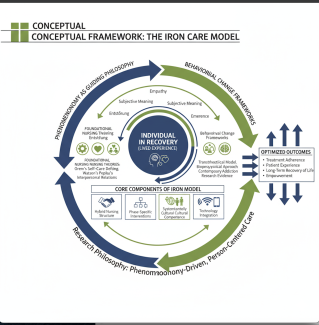Applying interventions designed to reduce and manage the symptoms of substance use disorders.
Treatment
Can a "treatment specialist" also be seen as a "prevention specialist" and vice versa?
A contribution by Jeff Lee from the ISSUP INEP Plus facilitators training course.

Navigating stigma: a qualitative study of barriers to opioid treatment engagement in Tanzania
Background Stigma related to drug use is a well-documented barrier to engaging and remaining on medication for opioid use disorder (MOUD), yet little is known about how stigma operates across multiple social and institutional settings in...
Adherence to mHealth quit smoking application ‘stopcoach’ on top of evidence based smoking cessation counselling: association with participant characteristics and long-term abstinence
Background Smoking is more common in lower socioeconomic position (SEP) groups, but smoking cessation interventions are less effective for these groups. StopCoach, an mHealth intervention, supports people with lower SEP in quitting smoking...
Integrating Community-Based Interventions for Sustainable Addiction Recovery: A Case Study of Social Challenges and Rehabilitation Efforts in Sungai Asap, Belaga, Sarawak, Malaysia
Addiction remains a critical global challenge, requiring innovative, integrated, and sustainable approaches for effective rehabilitation and social reintegration. The growing prevalence of substance abuse, particularly in marginalized...
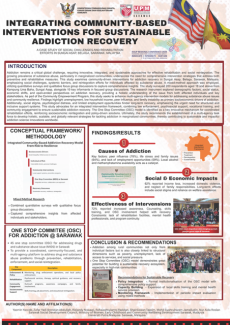
Cognitive Behavioural-Spiritual Counselling Model (CBT-Spiritual) in Resiliency Enhancement for People with Substance Abuse Disorder
Drug abuse is increasingly concerning, requiring a rehabilitative approach through effective counselling by the Indonesian Government by strengthening drug prevention and eradication, because drug abuse in Indonesia is increasingly...
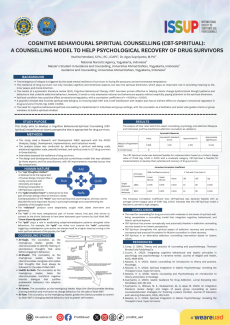
Enduring and Flourishing: An Exploration of Factors Promoting Self-Acceptance in Therapy Clients
Substance abuse in Indonesia is on the rise each year. Rehabilitation centers play a crucial role in helping individuals recover from addiction and improve their quality of life (recovery, productivity, and social functioning). However...
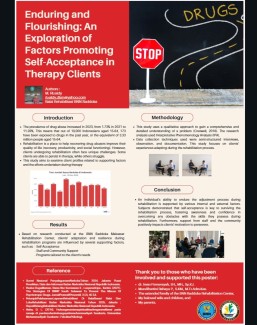
From Data to Action: Strengthening Child Rehabilitation through the SERASI, BERJAYA, and SINARI Sekolah Programs
Adolescent drug abuse in Indonesia is rising, with prevalence among ages 15-24 increasing from .96% IN 2021 to 1.97% in 2023. About 181 per 10,000 adolescents as of February 2025. BNN recorded 3.3 million drug users, including 312,000...
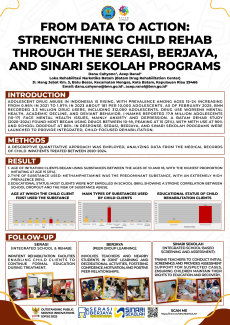
The Correlation Between Age With Drugs Abuse In Rehabilitation Center Of National Narcotics Board Lido 2019
The research is motivated by the results of a preliminary study at the Rehabilitation Center of National Narcotics Board Lido which shows the existence of drug abuse with a wide range of age groups at the age of 12-60 years and various...
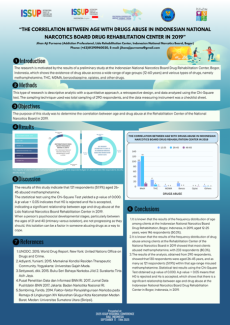
Characteristics of Patients with Substance Use Disorder and Co-occuring Disorder Underwent Inpatient Rehabilitation at RSKO Jakarta from 2022 to 2024
Co-occurring disorder is a condition where substance use disorder accompanied by other mental health problem that occur simultaneously and mutually influence disease symptom, health outcomes and risk of relapse. Around 35% people age 18 and...
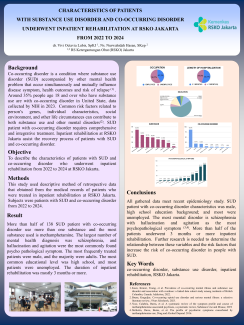
The Integrated Recovery-Oriented Nursing (IRON) Care Model: A Theoretical Framework for Optimizing Addiction Treatment Outcomes
Abstract Title: The Integrated Recovery-Oriented Nursing (IRON) Care Model: A Theoretical Framework for Optimizing Addiction Treatment Outcomes Authors: Ahmad Muneer, MSc, RN; Hessa Abdel Qader, MSc, RN Affiliations: Maudsley Health, Al...
